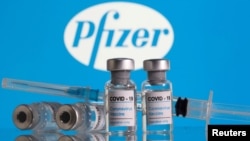ການຄົ້ນຄວ້າໃໝ່ ສະແດງໃຫ້ເຫັນວ່າ ຢາວັກຊີນກັນໂຄວິດ-19 ຂອງບໍລິສັດ ຟາຍເຊີ
ໄບໂອແອນເທັກ ໄດ້ຜົນໃນການຕໍ່ຕ້ານເຊື້ອໄວຣັສກາຍພັນໃໝ່ ຢູ່ອາ ຟຣິກາໃຕ້ ເຖິງ
ແມ່ນມັນໄດ້ສ້າງພູມຕ້ານທານທີ່ຕອບໂຕ້ຕໍ່າໄປໜ້ອຍນຶ່ງ.
ຢູ່ໃນລາຍງານ ຂອງວາລະສານການແພດ ນິວອິງເລີນ (New England Journal of
Medicine) ບັນດານັກຄົ້ນຄວ້າຂອງບໍລິສັດຟາຍເຊີ ແລະມະຫາ ວິທະຍາໄລ ສາຂາ
ການແພດ ລັດເທັກຊັສ (Texas Medical Branch) ໄດ້ ສ້າງເຊື້ອໄວຣັສທີ່ຄ້າຍຄືກັນ
ກັບໄວຣັສກາຍພັນໃໝ່ ດັ່ງທີ່ພົບເຫັນຢູ່ອາຟຣິກາ ໃຕ້ ທີ່ຕັ້ງຊື່ໃຫ້ B.1.35.1. ເຂົາເຈົ້າ
ໄດ້ທົດລອງ ການສ້າງເຊື້ອໄວຣັສຕໍ່ໂຕຢ່າງ ເລືອດຂອງຄົນ ຜູ້ທີ່ໄດ້ຮັບການສັກຢາວັກ
ຊີນສອງເຂັມຂອງຟາຍເຊີໄບໂອແອນເທັກ.
ຜົນການພົບເຫັນກໍຄືວ່າ ຄວາມສາມາດຂອງຢາວັກຊີນ ທີ່ສ້າງພູມຕ້ານທານຕໍ່ ຮ່າງກາຍ
ນັ້ນ ໄດ້ຫລຸດລົງສອງສ່ວນສາມ ປຽບທຽບໃສ່ຜົນທີ່ໄດ້ຮັບ ຕໍ່ເຊື້ອໄວ ຣັສທົ່ວໄປສ່ວນໃຫຍ່.
ຢູ່ໃນໜັງສືທີ່ພິມເຜີຍແຜ່ຕ່າງຫາກໃນວາລະສານ NEJM ນັ້ນ ບໍລິສັດເຮັດຢາໂມເດີນາ
ຂອງສະຫະລັດ ກ່າວວ່າ ຕົນໄດ້ພົບເຫັນຜົນທີ່ຄ້າຍຄືກັນກັໍບການສັກ ຢາວັກຊີນສອງ
ເຂັມກັນໂຄວິດ-19 ຂອງຕົນ ໃນການຕໍ່ສູ້ກັບໄວຣັສສາຍພັນໃໝ່ B.1.35.1.
ບໍລິສັດຟາຍເຊີ ແລະໄບໂອແອນເທັກ ໄດ້ອອກຖະແຫຼງການກ່າວວ່າ ເຂົາເຈົ້າ ໄດ້ເຮັດ
ການລົງທຶນ ທີ່ມີຄວາມຈຳເປັນ ແລະລົມກັບບັນດາຜູ້ອອກກົດລະບຽບ ໃນຄວາມຄາດ
ໝາຍທີ່ຈະພັດທະນາແລະຍົກລະດັບໃໝ່ຢາວັກຊີນຫຼືການສັກຢາ.
ໃນຂະນະດຽວກັນ ຮົງກົງ ໄດ້ອະນຸມັດຢ່າງເປັນທາງການ ໃຫ້ໃຊ້ສຸກເສີນ ຢາ ວັກຊີນກັນ
ໄວຣັສໂຄໂຣນາຊິໂນແວັກ ທີ່ຜະລິດໃນຈີນ. ການອະນຸມັດຢາ ດັ່ງ ກ່າວໄດ້ມີຂຶ້ນຫຼັງຈາກ
ຄະນະກຳມະການໃຫ້ຄຳແນະນຳພິເສດຂອງຮົງກົງ ກ່ຽວ ກັບຢາວັກຊີນກັນໂຄວິດ-19
ໄດ້ສະເໜີໃຫ້ໃຊ້ ເຖິງແມ່ນວ່າ ໃນຄວາມຈິງແລ້ວ ບໍລິສັດຈີນຍັງບໍ່ທັນໄດ້ນຳອອກເຜີຍ
ແຜ່ຜົນຢູ່ຫ້ອງທົດລອງຂັ້ນຫລ້າສຸດເທື່ອເພື່ອ ພິຈາລະນາວ່າ ຢາວັກຊິນໄດ້ຜົນຢ່າງແທ້
ຈິງຫຼືບໍ່.
A new study shows the new Pfizer-BioNTech COVID-19 vaccine is effective against the South African variant of the virus, although it generates a slightly lower immune response.
In a report published Wednesday in the New England Journal of Medicine, researchers with Pfizer and the University of Texas Medical Branch created a version of the virus that carried the same mutations found in the South African variant dubbed B.1.35.1. They tested the engineered virus against blood samples from people who had received both doses of the Pfizer-BioNTech vaccine.
The results found the vaccine’s ability to produce antibodies was reduced by two-thirds, compared with its effect on the most common version of the virus.
In a separate letter published in the NEJM, U.S. drugmaker Moderna says it has discovered similar results with its two-dose COVID-19 vaccine in fighting the B.1.35.1 variant.
Pfizer and BioNTech issued a statement saying they were making the necessary investments and talking with regulators in anticipation of developing an updated version of the vaccine or a booster shot.
Meanwhile, Hong Kong has formally granted emergency use authorization to Chinese-based Sinovac’s coronavirus vaccine. The drug’s approval came after the city’s special advisory panel on COVID-19 vaccines recommended its use despite the fact the company has not publicly released the results of a late-stage clinical trial to determine the vaccine's true effectiveness.





